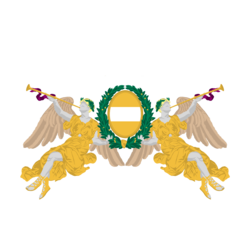Tengarian State (1930-1933)
This article is incomplete because it is pending further input from participants, or it is a work-in-progress by one author. Please comment on this article's talk page to share your input, comments and questions. Note: To contribute to this article, you may need to seek help from the author(s) of this page. |
Tengarian State Тенгарска държава Tengarska Dŭrzhava | |||||||||
|---|---|---|---|---|---|---|---|---|---|
| 1930–1933 | |||||||||
Coat of arms
| |||||||||
| Motto: "Завинаги напред" Zavinagi Napred "Forever Forward" | |||||||||
| Anthem: Здравей републиката! Zdraveĭ Republikata! Hail the Republic! | |||||||||
| Status | Puppet state of the Kingdom of Amathia | ||||||||
| Capital | Lenovo | ||||||||
| Common languages | Tengarian | ||||||||
| Demonym(s) | Tengarian | ||||||||
| Government | Authoritarian Client Republic | ||||||||
| Supreme Legate | |||||||||
• 1930-1933 | Ghenadie Isărescu | ||||||||
| Plenipotentiary | |||||||||
• 1930-1932 | Cristian Fieraru | ||||||||
• 1932-1933 | Pavel Alexandruescu | ||||||||
| Minister-President | |||||||||
• 1930-1931 | Nedelcho Dimov | ||||||||
• 1931-1932 | Vasil Stoychev | ||||||||
• 1932-1933 | Genadi Grozdanev | ||||||||
| Legislature | Senate | ||||||||
| State Council | |||||||||
| Chamber of Deputies | |||||||||
| History | |||||||||
• Government formed | 21 September 1930 | ||||||||
• Liberation of Lenovo | 24 October 1933 | ||||||||
| Currency | Lev | ||||||||
| |||||||||
| Today part of | Tengaria | ||||||||
The Tengarian State (Tengarian: Тенгарска държава or Tengarska Dŭrzhava) was a collaborationist republican and functionalist government of Tengaria during the hostile occupation by the Kingdom of Amathia during the Great War. It was aligned with the Entente, although it did not have widespread international recognition.
The state was founded following the capture of the city of Lenovo by Amathian forces in September of 1930, in which the incumbent government of the Empire of Tengaria was either captured, killed, fled into exile in Visnagrad. The Amathian occupiers were looking for a means of establishing legitimacy to their control over Tengaria, decided to implement a native puppet government in the main areas of Tengaria. Although the Amathians hoped to utilize a common Solarian identity, the Solarianists in Tengaria were vehemently opposed to the foreign occupation and aligned with the resistance. The nationalist republicans and functionalists who had been excluded from the Imperial government found with the collapse of the Empire an oppurtunity to come to power. The leader of the republican movement in Tengaria, Nedelcho Dimov, agreed to form a government under Amathian oversight. They were joined by former moderates and some members of Tengaria's left-wing.
The Tengarian State comprised the historical region of Tengaria, alongside the regions of Istros and Armonia. Calia and Auroria were directly annexed by Amathia, and Visoclesia remained under the control of the resistance forces of Simeon Kovachev and the Free Solarian Army. Poltically, the state was heavily authoritarian and nationalist, and sought to cut ties from the Solarian legacy of the Empire and establish a Tengarian identity, influencing much of the policies which would become enshrined in the later Tengarian Republic. Although autonomous to a degree with a cabinet and legislature, the Amathian military command and the plenipotentiary still had significant control over the state and its operations. As the war progressed, the State became increasingly radicalized, with Genadi Grozdanev's National Salvation Front taking power in January of 1932. During this time, forced attempts of Tengarianization would result in several atrocities being committed, particularly against the Savader populace.
Eventually, the progress of the war turned against the Amathians and the Entente, and with the help of Soravia the resistance forces successfully were able to liberate the area and topple the regime by October of 1933. Some of the most prominent collaborators were executed by Kovachev, but others were fled into exile. After the formation of the Tengarian Republic in 1935, many of the collaborators would be quickly pardoned and would return to Tengaria, with some later taking powerful positions within the Republic. Although never widely popular during its time, during the Republic its reputation was somewhat rehabilitated due to its anti-monarchism, although it was also criticised for ceding lands which properly belonged to Tengaria. After the Patriot victory over the republicans in Tengarian Civil War, the State has largely been vilified within Tengaria.
